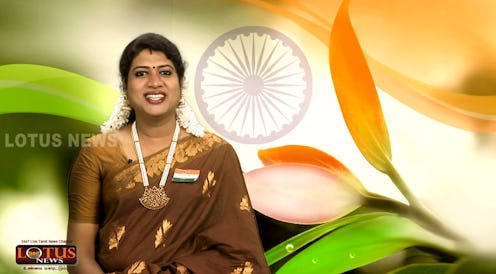News
Meet India's First Transgender News Anchor

Last week marked yet another great stride for the LGBTQ community: 31-year-old transgender woman Padmini Prakash became India's first transgender TV news anchor, and it happened on the nation's Independence Day no less. Prakash is currently the face of the Lotus News Channel's daily 7 p.m. special bulletin, and her place in the spotlight comes on the heels of a major Supreme Court decision in India, which officially recognized transgender people as a "third gender." In so doing, the court also extended the rights to education, jobs, and driver's licenses to the trans community, declaring that "recognition of transgenders as a third gender is not a social or medical issue but a human rights issue."
Unfortunately, these rights do not yet pertain to India's gay, lesbian, or bisexual citizens. Over the years, the transgender community in India has been met with greater acceptance due to the fact that transgender characters have a strong presence in Hindu culture. The Supreme Court ruling specifically refers to eunuchs, or hirjas in Hindi, who often appear in Hindu religious ceremonies and epics (though a eunuch is defined as "a man who has been castrated," which is obviously entirely different than being transgender, it still indicates an awareness of different gender identities). In an interview with The Washington Post, Indian transgender citizen Rose Venkatesan explains the significance of her community in India:
Granting rights to transgenders is more acceptable to our psyche because we find many transgender characters in our religious, cultural mythologies and literature. Some of our Hindu Gods were of third-gender, some Gods changed their gender seamlessly to perform specific roles and rituals. There are temples and annual religious festivals for the transgender community.
Although the court ruling is progressive, there is still much work to be done in order to legalize homosexuality and provide for the human rights of the gay community. It seems that India is in the process of considering this kind of reform after the government filed a curative petition earlier this year. As of late, a new Supreme Court bench is currently reviewing India's laws on homosexuality, so let's hope for a favorable ruling.
Still, the on-air presence of the first transgender TV news anchor suggests an increasing climate of acceptance in India. And it seems the nation could not have picked a better candidate to be a trailblazer for the LGBTQ community. At a young age, Prakash cut ties with her family and dropped out of college to avoid the heavy stigma of being a transgender woman. She then went on to become a successful dancer and actress, as well as the winner of multiple transgender beauty contests. More importantly, she has been very vocal over the years about ensuring the rights of trans individuals, serving as a social activist for transgender rights.
In short, she is a model spokeswoman for transgender people in India and across the globe. In addition, her presence on television promises to increase public exposure of the trans community. Just one month after she began reporting for the Lotus News Channel, Prakash had already received an outpouring of support from fans and the media. And this support is bound to increase as she continues on in her career.
One can only hope that Indian society's overwhelming acceptance of Prakash will have a domino effect in other countries. Nations like Germany, Pakistan, and Bangladesh, for instance, have already begun to offer increased rights for the transgender community, and there are many others that would do well to follow in their example (we're looking at you, Russia). One can also hope that Prakash will encourage transgender individuals in these other nations to feel confident stepping into the spotlight. The more societies are introduced to successful transgender people on TV, the greater the potential for instituting transgender rights in the future. And the greater the potential for one day creating a culture where LGBTQs are as common as heterosexual individuals in the media.
Images: Ashar Jawad/Twitter